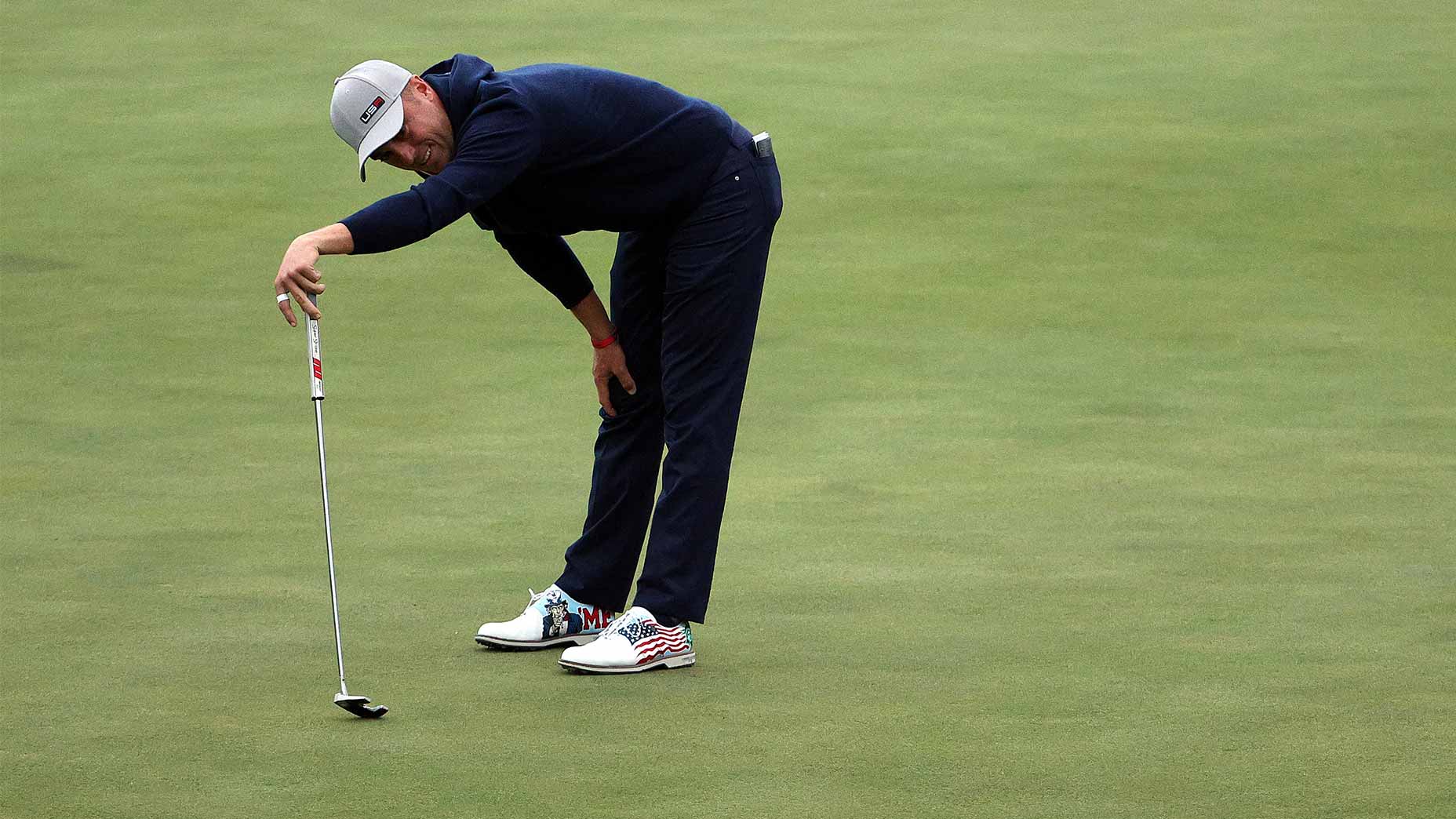HAVEN, Wisconsin — A consequence of runaway victories in the Ryder Cup is that the post-mortem commences before the deceased has officially even hit the slab, and so it is with the European team that seems likely destined for defeat Sunday at Whistling Straits.
The social media second-guessing was underway by the end of the first session — which shared a demoralizing symmetry with the two that followed it: USA 3, Europe 1 — and built as steadily as the afternoon breeze off Lake Michigan. Even that roomy scoreline might have suggested matters were more competitive than they actually were.
Predictably, criticism has centered on decisions made in combat by Captain Padraig Harrington.
Why bust up Friday morning’s only winning team (Sergio Garcia and Jon Rahm)?
Why send out Lee Westwood and Matt Fitzpatrick in Saturday’s Foursomes when they produced just a single birdie in that same format on Friday?
Why Ian Poulter, his worst ball-striker, for alternate shot, a format in which his struggles would also doom his partner?
Why sit Shane Lowry, who brought an inspiring, fiery intensity to Saturday’s Four-Ball, for two of the first four sessions?
One cynical fan even wondered why Harrington invested so much of the continent’s hopes in players from a nation that had left the European Union — the six English team members had, through three sessions, combined for just two half-points in eight matches.
While dissenters criticized, loyalists rationalized. As Europe fell ever farther adrift, complaints grew about loud-mouthed, abusive fans. There were some (there always are), but the lopsided score in favor of the home team robbed their bellowing of the usual nastiness.
Objection dismissed.
There were suggestions that the absence of European fans due to the pandemic travel ban was hugely impactful — a sleight of speech that ignores one salient fact: had the entire gallery been from Europe, they would still have had nothing to cheer about. There’s not much reason to whoop if your team is finding the center of the clubface as often as a blind man does a black cat in a dark room.
There’s actually a reasonable argument that the seeds of Europe’s struggle were sown more than two years ago, and allowed to take root during the COVID chaos.
In May of 2019, the European Tour’s tournament committee ratified Harrington’s request to reduce his number of captain’s picks from four to three. Later, as the qualification process for both teams was compromised by schedule changes forced by the pandemic, the captains took differing tacks. Steve Stricker got six captain’s picks instead of the usual four, half of his team. Harrington could have pushed for more picks too, but opted against, despite the European Tour schedule being more ravaged than its U.S. counterpart.
He believes forcing guys to qualify is preferable, and that being picked creates more pressure. A defensible outlook, sure, but an optimistic one when a pandemic is upending the schedule and limiting the amount of travel and starts being made by players. In the end, Harrington’s picks have arguably been less disappointing than his automatic qualifiers, particularly those who occupied the final two spots on that list.
Westwood made the team thanks to three second-place finishes (in Dubai to end 2020, and back-to-back weeks in March at the Arnold Palmer Invitational and The Players Championship). In 14 events since, he has one top-20 finish, and that was a T-18. Fitzpatrick won that event in Dubai nine months ago, but has had only one impressive finish since April.
Would they be here if Harrington had fewer automatics and more picks? Possibly. After all, his options were slender. Justin Rose is in middling form. Victor Perez the same, and untested. It’s barely an exaggeration to say Europe’s non-playing vice-captains had more merit than some in its starting lineup.
Harrington has all the attributes one expects in a worthy Ryder Cup captain: an impeccable playing career that brought him three major titles, deep experience in this team competition, the unqualified respect of his players, and a (sometimes manic) attention to detail. Those are traits that often lead to a winning captaincy. Unfortunately, he also has a so-so squad that arrived in beggarly form and that is for the most part performing poorly. That almost guarantees a losing captaincy.
All is not lost, obviously, but the chances of a comeback for the Old World on Sunday are awfully faint. Defeat should not come as a shock. The European empire has held almost unbroken sway for two decades, but this week was always going to be a struggle. Circumstances favored Stricker building a team from America’s next generation. Tiger Woods is sidelined, Phil Mickelson was gracefully ushered to the back benches and old-timers Matt Kuchar and Bubba Watson didn’t qualify. Stricker faced just one tough call, and made the right one: to leave Patrick Reed (and his inner circle) at home.
Harrington, however, had no choice but to bet on the last stand of Europe’s aging generation, to hope for one last stirring lap from thoroughbreds who are, in Ryder Cup terms at least, much more likely to stumble into the glue factory than streak to glory. Not only did the trusty old nags fail to perform, even his show pony — Rory McIlroy — has been woefully disappointing.
For 20 years, American players have heard how they need to be more like the Europeans if they want to own the Ryder Cup again. Regardless of what happens Sunday, that existential crisis is now firmly Europe’s to ponder. They have two years to figure out the generation of players who will build a new empire. Because the old one is over.









